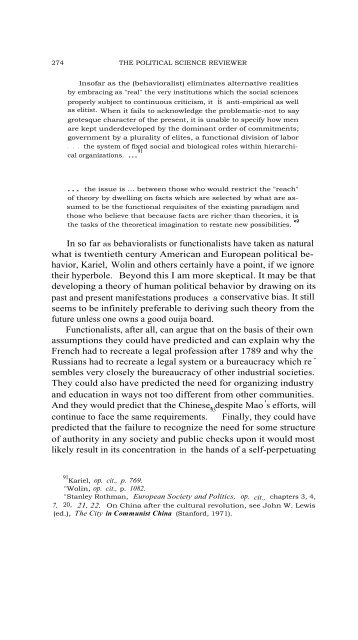FUNCTIONALISM AND ITS CRITICS - Intercollegiate Studies Institute
FUNCTIONALISM AND ITS CRITICS - Intercollegiate Studies Institute
FUNCTIONALISM AND ITS CRITICS - Intercollegiate Studies Institute
You also want an ePaper? Increase the reach of your titles
YUMPU automatically turns print PDFs into web optimized ePapers that Google loves.
274 THE POLITICAL SCIENCE REVIEWER<br />
Insofar as the (behavioralist) eliminates alternative realities<br />
by embracing as "real" the very institutions which the social sciences<br />
properly subject to continuous criticism, it is anti-empirical as well<br />
as elitist. When it fails to acknowledge the problematic-not to say<br />
grotesque character of the present, it is unable to specify how men<br />
are kept underdeveloped by the dominant order of commitments;<br />
government by a plurality of elites, a functional division of labor<br />
. . . the system of fixed social and biological roles within hierarchical<br />
organizations. ... 91<br />
... the issue is ... between those who would restrict the "reach"<br />
of theory by dwelling on facts which are selected by what are assumed<br />
to be the functional requisites of the existing paradigm and<br />
those who believe that because facts are richer than theories, it is<br />
the tasks of the theoretical imagination to restate new possibilities. e2<br />
In so far as behavioralists or functionalists have taken as natural<br />
what is twentieth century American and European political behavior,<br />
Kariel, Wolin and others certainly have a point, if we ignore<br />
their hyperbole. Beyond this I am more skeptical. It may be that<br />
developing a theory of human political behavior by drawing on its<br />
past and present manifestations produces a conservative bias. It still<br />
seems to be infinitely preferable to deriving such theory from the<br />
future unless one owns a good ouija board.<br />
Functionalists, after all, can argue that on the basis of their own<br />
assumptions they could have predicted and can explain why the<br />
French had to recreate a legal profession after 1789 and why the<br />
Russians had to recreate a legal system or a bureaucracy which re -<br />
sembles very closely the bureaucracy of other industrial societies.<br />
They could also have predicted the need for organizing industry<br />
and education in ways not too different from other communities.<br />
And they would predict that the Chinese, despite Mao 's efforts, will<br />
continue to face the same requirements. 93<br />
Finally, they could have<br />
predicted that the failure to recognize the need for some structure<br />
of authority in any society and public checks upon it would most<br />
likely result in its concentration in the hands of a self-perpetuating<br />
91 Kariel, op. cit., p. 769.<br />
"Wolin, op. cit., p. 1082.<br />
"Stanley Rothman, European Society and Politics, op. cit., chapters 3, 4,<br />
7, 20, 21, 22. On China after the cultural revolution, see John W. Lewis<br />
(ed.), The City in Communist China (Stanford, 1971).
















